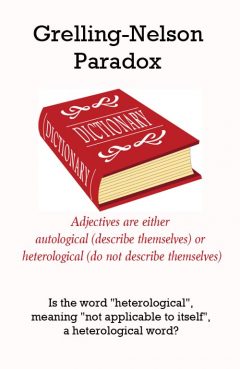Grelling-Nelson Paradox (aka Wey's or Weyl's paradox and Grelling's Paradox)

Release Date: //1908
Country of Release:
Length:
MPAA:
Medium: Paradox
Genre:
Release Message: Is the word "heterological", meaning "not applicable to itself", a heterological word? Authored by Kurt Grelling, and Leonard Nelson.
Description: The Grelling-Nelson paradox is a semantic self-referential paradox formulated in 1908 by Kurt Grelling and Leonard Nelson and sometimes mistakenly attributed to the German philosopher and mathematician Hermann Weyl. It is thus occasionally called Weyl's paradox as well as Grelling's paradox. It is closely analogous to several other well-known paradoxes, in particular the Barber paradox and Russell's paradox. Suppose one interprets the adjectives "autological" and "heterological" as follows: An adjective is autological (sometimes homological) if and only if it describes itself. For example "short" is autological, since the word "short" is short. "English," "unhyphenated" and "pentasyllabic" are also autological. An adjective is heterological if it does not describe itself. Hence "long" is a heterological word, as are "unwritten" and "monosyllabic". All adjectives, it would seem, must be either autological or heterological, for each adjective either describes itself, or it doesn't. Problems arise in a number of instances, however: Paradoxical cases The Grelling-Nelson paradox arises when we consider the adjective "heterological". One can ask: Is "heterological" a heterological word? If the answer is 'no', "heterological" is autological. This leads to a contradiction. In this case, "heterological" does not describe itself: it must be a heterological word. If the answer is 'yes', "heterological" is heterological. This again leads to a contradiction, because if the word "heterological" describes itself, it is autological. Is "heterological" a heterological word? no "heterological" is autological "heterological" describes itself "heterological" is heterological, contradiction yes "heterological" does not describe itself "heterological" is not heterological, contradiction.